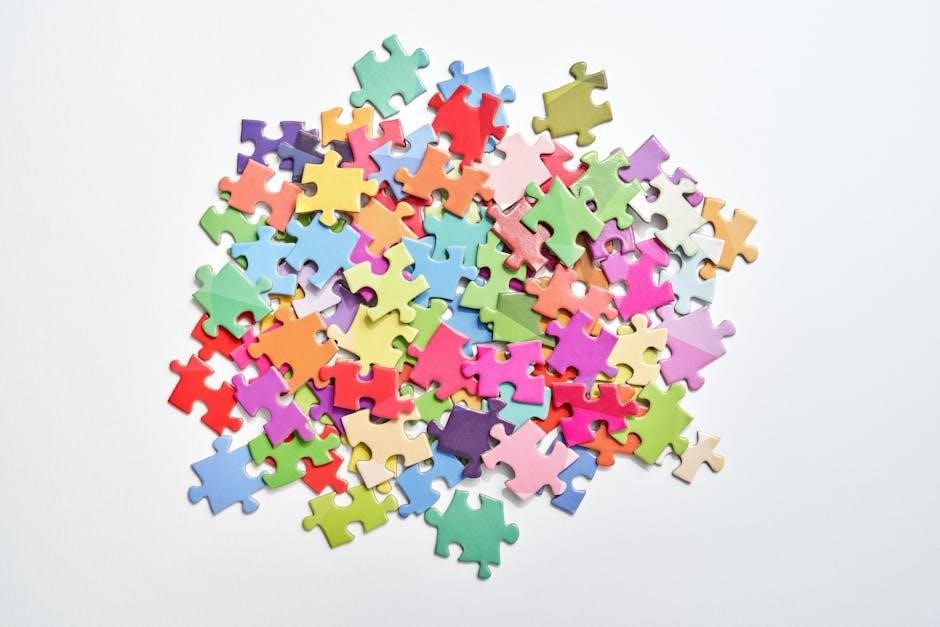The Mental Game of Trading is a comprehensive guide by Jared Tendler, offering strategies to overcome psychological challenges like greed, fear, and anger. Available as a PDF and eBook, it provides a step-by-step system for mastering emotional control and discipline in trading.
1.1 Understanding the Importance of Psychology in Trading
Psychology plays a pivotal role in trading, as emotions like greed, fear, and anger significantly influence decision-making. Jared Tendler’s Mental Game of Trading highlights how these emotions can undermine even the best trading strategies. Mastering emotional control is essential, as successful trading is 90% psychological and 10% technical. The book provides practical strategies to manage these emotions, ensuring disciplined and rational trading decisions.
1.2 Overview of the Mental Game of Trading PDF
The Mental Game of Trading PDF by Jared Tendler offers a detailed system to tackle emotional and psychological challenges in trading. It explores how emotions like greed, fear, and anger impact decisions and provides actionable strategies to build discipline and confidence. Available for download in PDF and eBook formats, this guide is essential for traders seeking to enhance their mental resilience and achieve consistent success.

Key Psychological Challenges in Trading
Traders face emotional obstacles like greed, fear, and anger, which can impair judgment and lead to impulsive decisions. Building discipline and emotional resilience is crucial for long-term success in trading.
2.1 Greed and Fear: The Double-Edged Sword of Trading Emotions
Greed and fear are the most prevalent emotional challenges in trading, often driving irrational decisions. Greed can lead to overconfidence and risky trades, while fear may cause hesitation or premature exits. Jared Tendler’s Mental Game of Trading highlights how these emotions create a cycle of destructive behavior.Mastering them requires self-awareness, discipline, and strategies to balance emotional responses for sustainable success.
2.2 The Role of Anger and Confidence in Decision-Making
Anger and confidence significantly influence trading decisions, often leading to impulsive actions. Excessive confidence can evolve into overconfidence, causing risky decisions, while anger may trigger revenge trading. Jared Tendler’s insights in The Mental Game of Trading emphasize managing these emotions to avoid poor judgment and maintain disciplined strategies for long-term success in the markets.
2.3 The Impact of Discipline on Trading Success
Discipline is crucial for trading success, acting as a shield against emotional biases like greed and fear. Jared Tendler’s Mental Game of Trading stresses that without self-control, even the best strategies fail. By adhering to predefined rules, traders can avoid impulsive decisions, ensuring consistency and emotional stability, which are vital for achieving profitability in the markets.

The Mental Game Framework
Jared Tendler’s Mental Game of Trading provides a structured approach to mastering emotional and psychological challenges. It outlines strategies for emotional awareness, problem-solving, and building mental resilience, essential for long-term trading success.
3.1 Jared Tendler’s Approach to Solving Psychological Problems in Trading
Jared Tendler’s approach focuses on identifying and managing emotional triggers, such as greed, fear, and anger, through self-awareness and structured strategies. His framework emphasizes understanding and controlling emotions rather than suppressing them, enabling traders to maintain discipline and consistency in their decision-making processes. This method is detailed in his Mental Game of Trading eBook, offering practical tools for sustainable success.
3.2 The Concept of Emotional Awareness and Control
Emotional awareness and control are vital for traders to navigate market volatility. Recognizing emotions like fear and greed allows traders to pause and reassess, preventing impulsive decisions. Techniques such as mindfulness and journaling help build resilience, ensuring emotions enhance rather than hinder trading performance, as emphasized in the Mental Game of Trading guide.

Strategies for Mastering the Mental Game
Mastering the mental game involves developing a disciplined mindset, using practical techniques to manage emotions, and building resilience to maintain focus and calm under pressure.
4.1 Developing a Trading Mindset
Developing a trading mindset involves cultivating emotional awareness, discipline, and resilience. It requires traders to understand their psychological strengths and weaknesses, manage emotions like fear and greed, and maintain consistency. This mindset is dynamic, evolving through learning and adaptation, ensuring traders can navigate market challenges effectively. The Mental Game of Trading PDF provides practical strategies to achieve this mental transformation.
4.2 Building Discipline and Emotional Resilience
Building discipline and emotional resilience is crucial for trading success. It involves adhering to strategies, managing losses, and staying calm under pressure. The Mental Game of Trading PDF emphasizes techniques like mindfulness and self-awareness to strengthen these traits, helping traders overcome emotional biases and maintain consistency in their decision-making processes, even during market volatility and unexpected setbacks.
4.3 Practical Techniques for Managing Emotions
Managing emotions is vital for traders, as outlined in the Mental Game of Trading PDF. Techniques include mindfulness, visualization, and journaling to track emotional states. These methods help traders stay focused, reduce impulsive decisions, and build emotional resilience, ensuring a clearer mindset for executing strategies effectively and maintaining long-term success in the markets.

The Role of Self-Awareness in Trading
Self-awareness is critical in trading, enabling traders to recognize emotional biases and understand their trading personality. It fosters disciplined behavior and rational decision-making, ensuring long-term success.
5.1 Identifying Personal Strengths and Weaknesses
Identifying personal strengths and weaknesses is crucial for traders to refine their strategies and emotional resilience. By understanding their psychological profile, traders can leverage strengths like discipline and confidence while addressing vulnerabilities such as impulsive decisions or fear of losses. This self-awareness enables them to adapt their approach, fostering consistent performance and emotional stability in volatile markets.
5.2 Understanding How Emotions Influence Decision-Making
Emotions play a pivotal role in trading decisions, often overriding logical analysis. Greed, fear, and anger can lead to impulsive choices, while confidence may enhance risk-taking. Jared Tendler’s work emphasizes recognizing these emotional triggers to maintain rationality. By understanding how emotions skew judgment, traders can develop strategies to mitigate their impact, fostering clearer thinking and more consistent outcomes in high-pressure situations.
The Evolution of a Trader’s Mindset
The mental game of trading evolves as traders progress from a “C-Game” to an “A-Game” mindset, overcoming emotional challenges and building discipline to achieve consistent success.
6.1 Moving from a “C-Game” to a “B-Game” Mindset
Traders transitioning from a “C-Game” to a “B-Game” mindset learn to recognize and manage impulses, avoiding costly mistakes like forcing trades or closing too early. This shift involves developing self-awareness and emotional control, enabling better decision-making and a more disciplined approach to trading, as outlined in Jared Tendler’s strategies for mastering the mental game.
6.2 The Journey to Achieving an “A-Game” in Trading
Achieving an “A-Game” in trading requires consistent practice, self-reflection, and mastery of emotional discipline. Traders at this level exhibit peak performance, making decisions aligned with their strategy without being swayed by emotions. Jared Tendler’s framework emphasizes the importance of mental preparation, resilience, and continuous learning to sustain this elite mindset and maintain long-term trading success.
The Importance of Risk Management
Risk management is crucial as it prevents emotional interference and ensures disciplined trading decisions. Proper strategies protect capital and maintain mental clarity, fostering long-term success.
7.1 How Risk Management Ties into the Mental Game
Risk management is integral to the mental game, as it prevents emotional interference and ensures disciplined decisions. Proper strategies protect capital, maintain mental clarity, and reduce stress. Techniques like position sizing and stop-loss orders help traders stay focused and avoid impulsive actions, fostering emotional balance and long-term success in the markets.
7.2 Strategies for Managing Risk Effectively
Effective risk management strategies include position sizing, stop-loss orders, and diversification. Emotional discipline ensures adherence to these tactics, preventing impulsive decisions. Regular portfolio reviews and stress testing also maintain mental clarity. These practices safeguard capital, reduce anxiety, and promote long-term trading consistency and success.
The Role of Learning and Adaptation
Learning from mistakes and adapting to market changes are crucial for growth. Analyzing errors and refining strategies enhance mental resilience, fostering long-term success in trading.
8.1 The Importance of Analyzing Trading Mistakes
Analyzing trading mistakes is vital for growth. Identifying patterns in errors helps traders understand emotional triggers and develop better strategies. This process fosters accountability and improves decision-making.
8.2 Adapting to Market Changes
Adapting to market changes is crucial for long-term success. Traders must stay flexible, updating strategies as conditions evolve. Emotional resilience and a growth mindset enable traders to pivot effectively, minimizing losses and capitalizing on new opportunities. Regular analysis of market trends ensures alignment with current dynamics, fostering adaptability and sustained performance in volatile environments.

Mental Preparation and Peak Performance
Mental preparation is essential for traders to achieve peak performance. Techniques like visualization and mindfulness help maintain focus and emotional stability, enabling better decision-making under pressure.
9.1 Techniques for Staying Focused and Calm
Techniques such as deep breathing, mindfulness meditation, and visualization can help traders stay focused and calm. These practices reduce stress and emotional reactivity, allowing for clearer decision-making. Regular mental exercises enhance self-awareness and resilience, crucial for maintaining composure during high-pressure trading situations. Consistency in these practices is key to building a stable mental framework.
9.2 The Role of Visualization and Mindfulness in Trading
Visualization and mindfulness are powerful tools for traders, enhancing mental clarity and emotional stability. Visualization helps traders rehearse successful outcomes and prepare for challenges, while mindfulness fosters present-moment awareness, reducing emotional reactivity. These practices, as discussed in Jared Tendler’s work, improve decision-making and overall trading performance by cultivating a focused and resilient mindset.
The Emotional Cycle of Traders
The emotional cycle of traders often oscillates between hope, fear, and desperation, driven by market volatility and personal psychology. Recognizing and breaking this cycle is crucial for maintaining rational decision-making and long-term success in trading.
10.1 Understanding the Cycle of Hope, Fear, and Desperation
The cycle begins with hope, as traders anticipate profits, often leading to overconfidence. This transitions to fear when losses occur, causing hesitation and poor decisions. Finally, desperation sets in, driving risky trades to recover losses. Breaking this cycle requires self-awareness and disciplined strategies, as outlined in Jared Tendler’s Mental Game of Trading PDF, to prevent emotional sabotage.
10.2 Breaking the Cycle of Negative Emotions
Breaking the cycle involves recognizing emotional patterns and implementing strategies to manage them. Techniques like mindfulness, journaling, and structured planning help traders stay calm and focused. Jared Tendler’s Mental Game of Trading PDF emphasizes the importance of emotional awareness and discipline to prevent negative emotions from dictating trading decisions and outcomes.
The Impact of Emotions on Trading Decisions
Emotions like greed, fear, and anger significantly influence trading decisions, often overriding logical strategies. Jared Tendler’s Mental Game of Trading PDF explores how emotional control is crucial for consistent success.
11.1 How Emotions Sabotage Rational Decision-Making
Emotions like greed, fear, and anger disrupt logical strategies, leading to impulsive decisions. Jared Tendler’s Mental Game of Trading PDF explains how these feelings create cognitive biases, causing traders to overtrade or hesitate. By understanding emotional triggers, traders can develop strategies to recognize and manage these biases, fostering more disciplined and rational decision-making in high-pressure situations.
11.2 Strategies for Overcoming Emotional Biases
Jared Tendler’s Mental Game of Trading PDF outlines strategies to overcome emotional biases through mindfulness, emotional awareness, and disciplined routines. Techniques like journaling and recognizing patterns help traders identify and manage biases, fostering rational decision-making and consistent performance.

Building Resilience in Trading
Jared Tendler’s Mental Game of Trading PDF emphasizes resilience through analyzing mistakes and emotional control, helping traders bounce back from losses while maintaining mental strength.
12.1 Coping with Losses and Setbacks
Coping with losses requires resilience and emotional stability. Jared Tendler’s Mental Game of Trading PDF highlights strategies to manage setbacks, emphasizing self-awareness and learning from mistakes. By understanding emotions like anger and fear, traders can develop a growth mindset, transforming losses into opportunities for improvement and strengthening their mental resilience over time.
12.2 Learning from Mistakes
Learning from mistakes is crucial for growth in trading. Jared Tendler’s Mental Game of Trading PDF emphasizes analyzing errors to identify patterns and improve decision-making. By understanding the emotional triggers behind mistakes, traders can refine their strategies, enhance discipline, and build resilience, turning setbacks into opportunities for long-term success and mental clarity in the markets.

Resources for Further Learning
The Mental Game of Trading PDF is a key resource, offering insights into trading psychology. Additional materials include online courses, eBooks, and trading communities, providing traders with tools to enhance their skills and knowledge.
13.1 Recommended Books and eBooks on Trading Psychology
Jared Tendler’s The Mental Game of Trading is a standout resource, offering practical strategies to tackle emotions like greed and fear. Available as a PDF and eBook, it complements other notable works on trading psychology, ensuring traders have diverse tools to refine their mindset and improve decision-making abilities. These resources are essential for both novice and experienced traders seeking mental clarity and resilience.
13.2 Online Courses and Communities for Mental Game Development
Online platforms like Perlego offer access to eBooks and courses on trading psychology, including Jared Tendler’s insights. Communities and forums dedicated to mental game development provide traders with shared knowledge, strategies, and support systems. These resources foster continuous learning and adaptation, helping traders refine their emotional resilience and decision-making skills in a dynamic trading environment.
